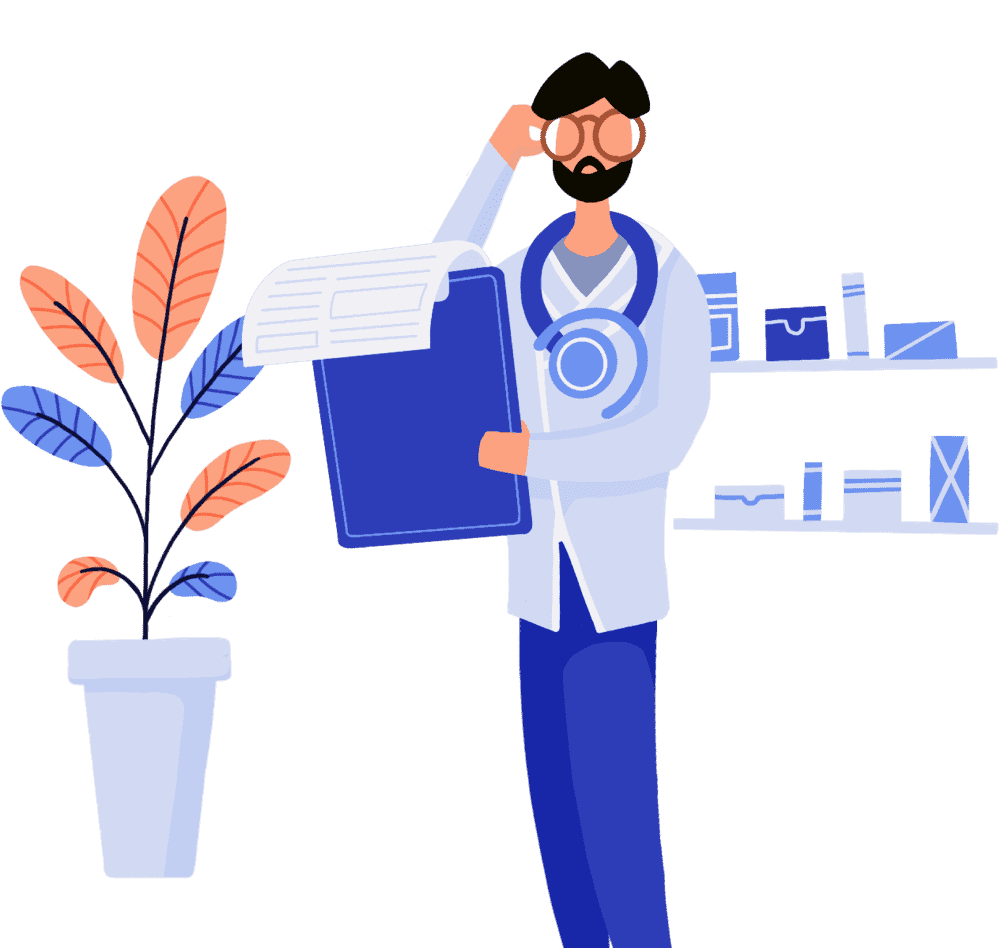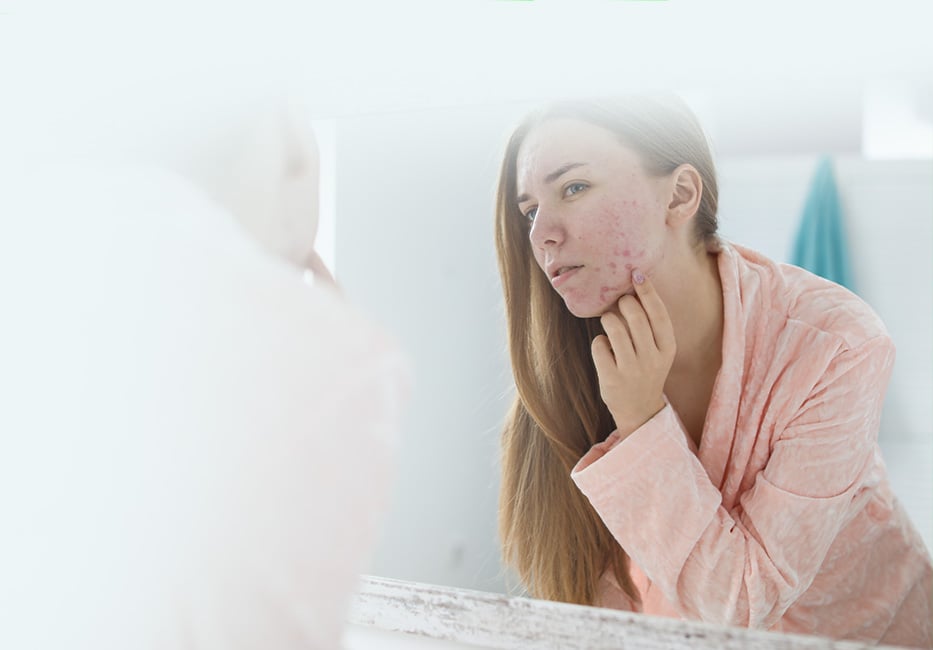Recharge your cells from within and enjoy 20% OFF NAD+ for a limited time only - shop now
- Home
- Chronic Conditions
- Acne Treatment
Acne Treatment
Regain Your Confidence With Effective Acne Treatments
Acne is a long-term skin disease that is caused by hair follicles being clogged up by dead skin cells and oils. The side effect of this is spots that can become very inflamed and eventually leave scarring. Contrary to popular belief, the condition does not just affect teenagers and plenty of people of all ages suffer from acne.
Thankfully, we have numerous effective treatments for you to choose from, using the same reliable and safe service as always.
More Information
Why might someone want to treat acne?
People often want to treat acne because clearer skin can support better mental health and help protect everyday confidence. Although acne is a physical condition caused by blocked pores, inflammation and excess oil, the emotional impact can feel much bigger than the spots you see. Wanting your skin to improve so you can feel calm, comfortable and confident again is completely normal.
Understanding the hidden effects of acne
Acne can affect far more than your skin because it can change how you feel, how you behave and how you connect with friends or classmates. Doctors and dermatologists recognise that acne is linked with emotional distress, social difficulties and reduced confidence [1]. The table below outlines common emotional and social challenges that treating acne can help reduce.
| The concerns | How it can affect someone |
|---|---|
| Low Self-Confidence | You might feel shy or embarrassed, which can make it harder to feel good about how you look or how others see you. |
| Anxiety and Sadness | Studies show that acne can increase the risk of anxiety or low mood [2][3], especially when you first find out you have the condition. |
| Hiding Away | You may avoid parties, photos or social events because you do not want people to focus on your skin [4]. |
| Feeling Judged | Some people wrongly believe acne comes from poor diet or bad habits, which can leave you feeling blamed or misunderstood [5]. |
| Bullying | Sadly, young people are sometimes teased about spots [6]. This can be very hurtful and may affect confidence for a long time. |
| School and Work | Feeling worried about your skin can make it harder to focus in lessons or at work [7]. Some people may even avoid interviews because they feel self-conscious. |
| Physical Pain | Severe acne can feel itchy, sore or tender [8][9]. Treating it early can help prevent long-lasting marks or scarring. |
| Feeling Hopeless | If acne ever makes you feel like you cannot cope, it is important to speak to a trusted adult, GP or healthcare professional straight away. |
What is acne?
Acne is a common skin condition that happens when hair follicles become blocked with oil, dead skin cells and bacteria, leading to spots, blackheads and inflammation [10]. It can be mild with only a few blemishes or more severe with widespread, painful breakouts on the face, chest or back.
Acne can affect people of all ages, although it is especially linked with hormonal changes during puberty [11]. Many adults continue to experience it too, often due to shifts in hormones, stress or genetics.
Acne spots can appear in several forms [12]. Blackheads and whiteheads are the best known, but you may also see papules, which are small red bumps, or pustules, which are papules containing pus. More serious types include nodules, which are larger, tender lumps under the skin, and cysts, which are painful, fluid filled swellings that can lead to scarring. As well as physical discomfort, acne can affect confidence and mood, which is why understanding the condition and exploring suitable care can be reassuring.
Video: Understanding Acne Causes and Treatments
This video explains how acne is a medical condition caused by hormones and blocked pores rather than poor hygiene , and reviews effective treatments ranging from topical creams and gels to prescription tablets and laser therapy.
What causes acne?
Acne is caused when hormonal changes increase the amount of sebum, the natural oil made by your skin, which can block pores and lead to spots, blackheads and breakouts. These hormones include androgens, which are present in both men and women and play a key role in how active the sebaceous glands become [13][14].
These hormonal shifts can happen for many reasons, such as puberty, stress, menstrual cycles, pregnancy, changes in weather and certain skincare products. Because everyone’s skin reacts differently, learning what triggers your own flare-ups can make managing acne much easier.
Teenagers often develop acne because puberty brings a sharp rise in hormone levels that upsets the skin’s usual balance. Adults can also experience acne, especially during perimenopause or menopause when hormone levels fluctuate again. Learn more about menopause-related acne.
Acne is not caused by poor hygiene. The oil that congests your pores comes from your own skin and is not the same as dirt. Washing too often or using harsh cleansers can upset the skin barrier, which may lead to more oil production and more breakouts.
Makeup does not directly cause acne either. While some products can irritate sensitive skin [15], using non-comedogenic makeup is usually fine and can help cover visible spots so you feel more confident.
How can I treat acne?
Acne treatment options
The main way to treat acne is to use treatments that target blocked pores, excess oil and inflammation, which are the underlying causes of acne. Although acne cannot be completely cured because it is linked to hormones such as androgens, it can be managed well with the right medicines and skin care routine.
At UK Meds you can request a range of prescription acne treatments, including topical creams, gels and oral medicines. All requests for prescription medicines are reviewed through an online clinical consultation and a registered independent prescriber will decide whether a treatment is suitable. Some women may also be offered certain contraceptive pills that help regulate androgen levels, depending on individual suitability.
Comparison of acne treatment types
| Treatment type | How it works | Who it may suit | Key points |
|---|---|---|---|
| Topical creams and gels | Reduce blocked pores, excess oil and bacteria on the skin | People with mild to moderate acne | Often the first step in acne treatment and usually easy to apply |
| Oral medicines | Target inflammation and bacteria throughout the body | People with moderate or persistent acne | Suitability is decided by a registered independent prescriber |
| Contraceptive pills (selected types only) | Help regulate androgen levels that can trigger acne | Women whose acne is influenced by hormone levels | Not all contraceptive pills help acne |
| Over the counter products | Help lower bacteria and oil on the skin | People with mild or occasional breakouts | Some products can cause dryness or irritation |
Over the counter options such as benzoyl peroxide or salicylic acid may also help, although they can sometimes be too strong for sensitive skin. It can take a little trial and error to find what works best for you.
Your lifestyle can also influence acne. Foods do not directly cause spots, although some people find that certain ingredients may trigger flare ups. Following a gentle skin care routine, washing your face after exercise, avoiding heavy makeup and taking care of your overall health can all help reduce breakouts over time.
Can laser treatment be used to treat acne?
Yes, laser treatment can be used to treat mild to moderate acne when creams, gels or antibiotics have not helped enough. Laser therapy aims to reduce oil production, inflammation and bacteria in the skin.
Laser treatment comparison
| Laser treatment type | How it works | Suitable for | Not suitable for |
|---|---|---|---|
| Ablative laser treatment | Removes the top layer of skin to stimulate new skin growth | Mild to moderate acne that has not responded to other treatments | Severe acne, cystic acne or acne with significant scarring |
| Non ablative laser treatment | Heats deeper layers of skin to reduce oil production | Mild to moderate acne | Severe, cystic or scarring acne |
A healthcare professional can assess your skin and advise whether laser therapy is appropriate and safe for you.
Are skin gummies effective in treating acne?
Skin gummies are not proven to treat acne. Current research shows very limited evidence that these supplements help reduce breakouts, and some may carry risks because dietary supplements are not tightly regulated.
A study by Burns et al (2022) highlighted the importance of healthcare professionals advising patients on the safety of acne supplements. If you are thinking about trying gummies or vitamins, speak with a doctor or pharmacist first, especially if you already use prescribed acne treatments.
Our Commitment to Accurate and Reliable Information
At UK Meds, we take great care to provide accurate, trustworthy and up-to-date information about health, wellbeing and medical treatments. Our approach follows strict quality standards set out in our Editorial Policy and Content Policy.
All our articles are regularly reviewed by qualified professionals and updated when needed to make sure the information you read reflects the latest medical guidance. This helps you make confident, informed decisions before starting an online consultation with a registered independent prescriber for any treatment you may require.
However, the content on our website should never replace advice from a medical professional. Always speak to your GP, pharmacist or another qualified healthcare provider before starting any new medicine or making changes that could affect your health or lifestyle.
Page last updated: 19th November 2025
Medically Reviewed by:
Dr. Alexis Missick MBChB. MRCGP
GMC reference no: 7151419
LinkedIn
Website
Sources:
[3] Olivia Hughes, Anthony Bewley, Is it really ever ‘just acne’? Considering the psychodermatology of acne, British Journal of Dermatology, Volume 189, Issue Supplement_1, October 2023, Pages i11–i16, https://doi.org/10.1093/bjd/ljad251
[10] Acne - NHS
[11] Acne - British Association of Dermatologists
[12] Acne - NHS 111 Wales
Learn more with UK Meds support resources for Acne and Rosacea:
- What Causes Acne – Learn about the common causes of acne, from hormones and bacteria to lifestyle and skincare habits.
- How to Get Rid of Acne – Discover effective treatments and daily habits that can help clear up acne and prevent future breakouts.
- Guide to Duac Once Daily Gel for Acne – Find out how Duac gel works to reduce spots and inflammation and how to use it safely.
- Guide to Aknemycin Plus for Acne – Understand how Aknemycin Plus can treat mild to moderate acne and what to expect from treatment.
- How Does Oxytetracycline Work for Acne – Learn how this antibiotic helps reduce acne by fighting bacteria and calming inflammation.
- Can You Drink Alcohol While Taking Acne Medication – Find out if drinking alcohol affects acne treatments or increases side effects.
- Menopause Acne – Discover why hormonal changes during menopause can cause acne and what treatments can help manage it.
- When Does Pregnancy Acne Start – Understand why pregnancy acne happens and how to care for your skin safely while pregnant.
- What Is Tretinoin Cream Used For – Learn how tretinoin cream works to treat acne, fine lines and uneven skin texture.
- A–Z Guide to Tretinoin – Your complete guide to tretinoin, including how it works, how to use it and what to expect from treatment.
- How to Use Tretinoin – Follow expert tips on how to apply tretinoin safely for the best skin results with minimal irritation.
- What to Expect When Taking Tretinoin – Find out what happens when you start tretinoin treatment, including common side effects and improvements to look for.
- What Happens if You Stop Using Tretinoin – Learn how your skin may react when you stop using tretinoin and how to maintain results.
- How Long Does Tretinoin Take to Work – Understand how long it takes tretinoin to show visible improvements and why consistency is key.
- Is Tretinoin a Retinoid – Learn what makes tretinoin a prescription-strength retinoid and how it differs from over-the-counter products.
- Tretinoin vs Retinol – Compare tretinoin and retinol to see which may be right for your skin goals.
- Tretinoin, Treclin Gel and Ketrel Compared – Explore the similarities and differences between these popular acne treatments to make an informed choice.
- Can You Get Treclin Gel on the NHS – Find out if Treclin Gel is available on the NHS and what alternative options exist.
- Can You Get Tretinoin from the NHS – Understand the NHS prescribing rules for tretinoin and how to access it safely in the UK.
- How to Get a Tretinoin Prescription in the UK – Learn the steps to get a tretinoin prescription online through a regulated consultation with a registered independent prescriber.
Medication delivered the next day from UK pharmacies



Choose the right treatment
From the comfort of your own home or out on the go, choose the treatment you require from our extensive range.
Complete an online consultation
A vital part of our process, your online consultation will be similar questions to that of a GP. Quick and easy, we guarantee privacy and confidentiality.
Delivered discreetly
One of over 100 of our partner regulated UK pharmacies will dispense and ship the treatment to you in discreet packaging.
Rated out of 5 on 
excellent
Very good
excellent reliable service at all times
First class service.
Rated 4.6 out of 5 based on 6919 reviews
Here to help you
Our Customer Service is available Monday to Friday 9am - 5pm. If you need urgent assistance, do not use this service. Call 111, or in an emergency call 999. Visit our help section


